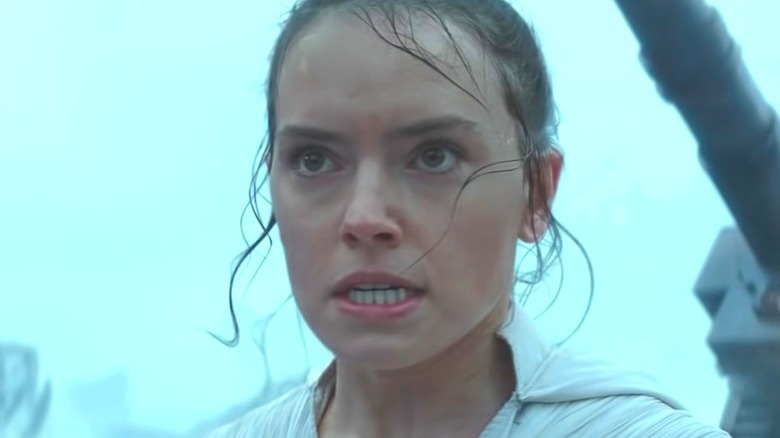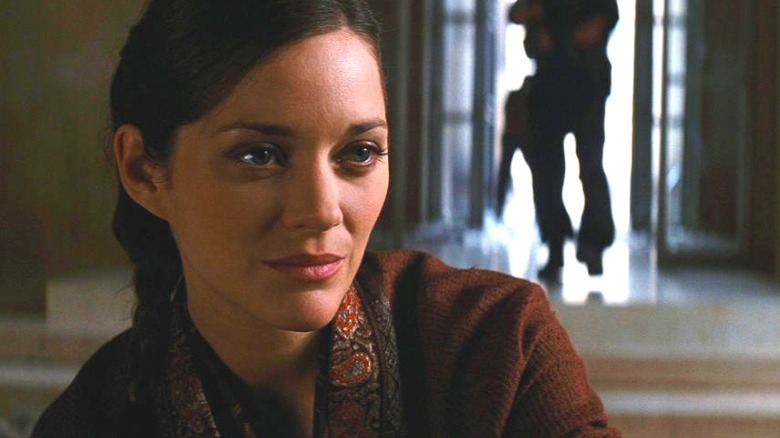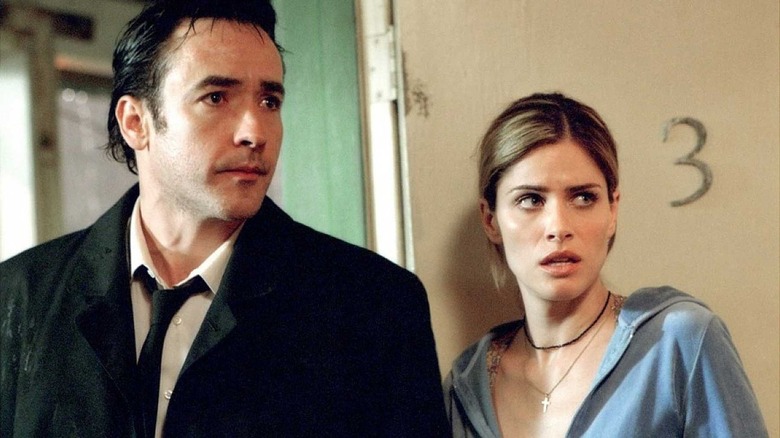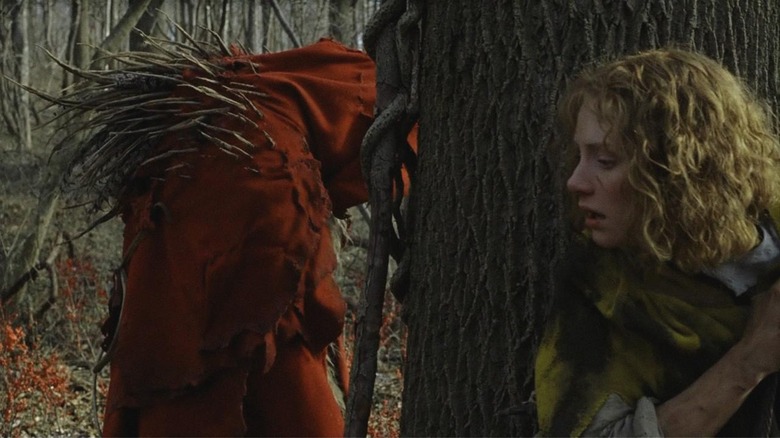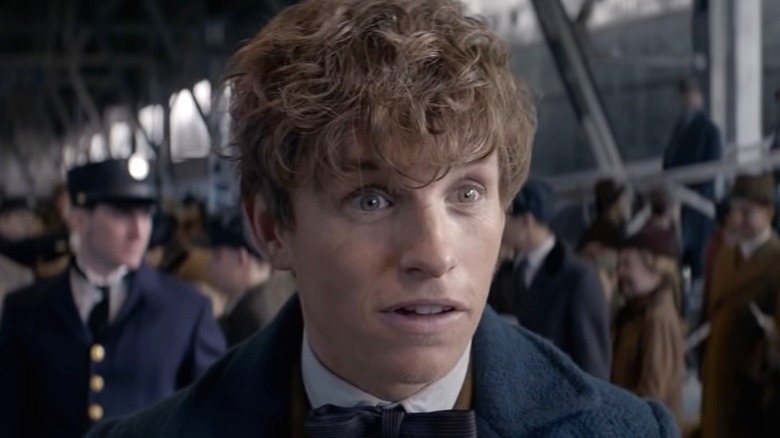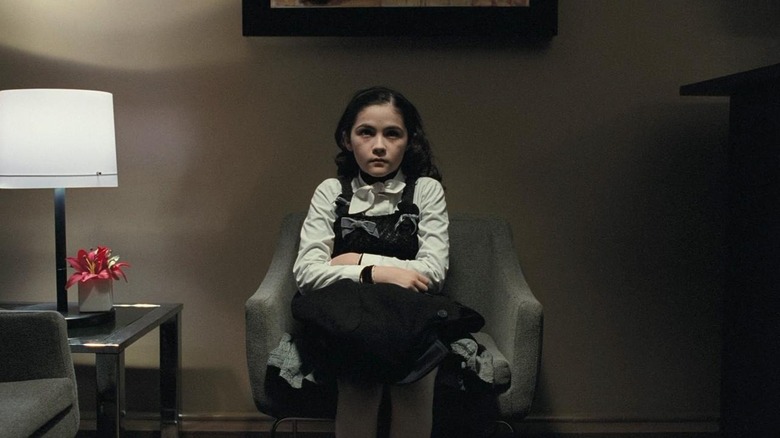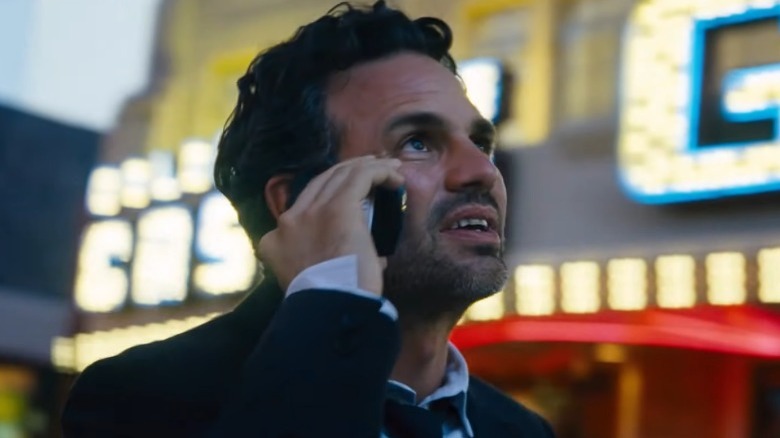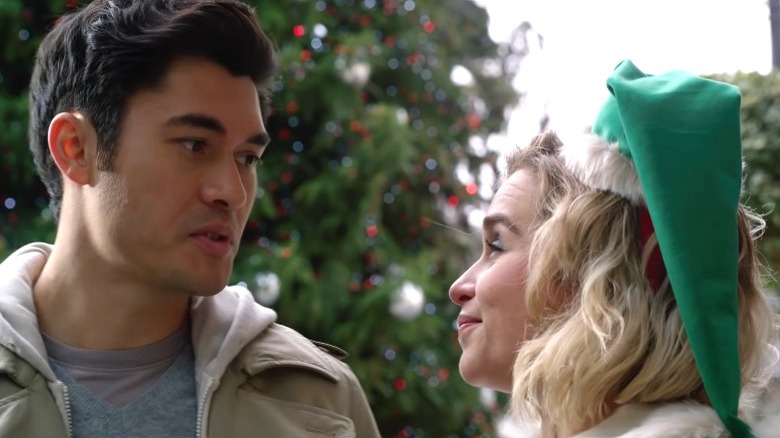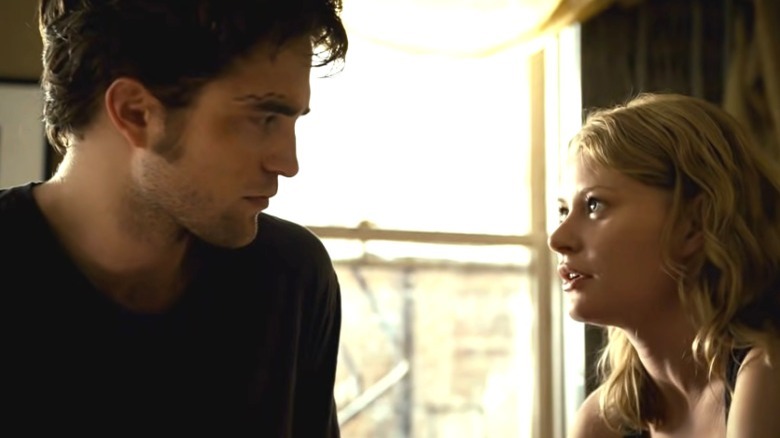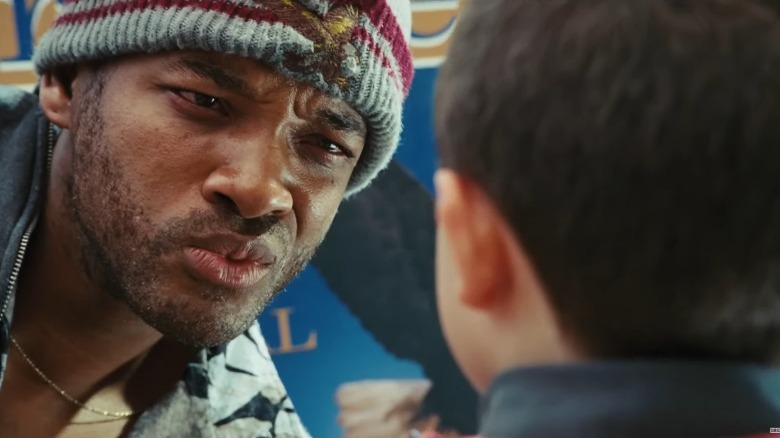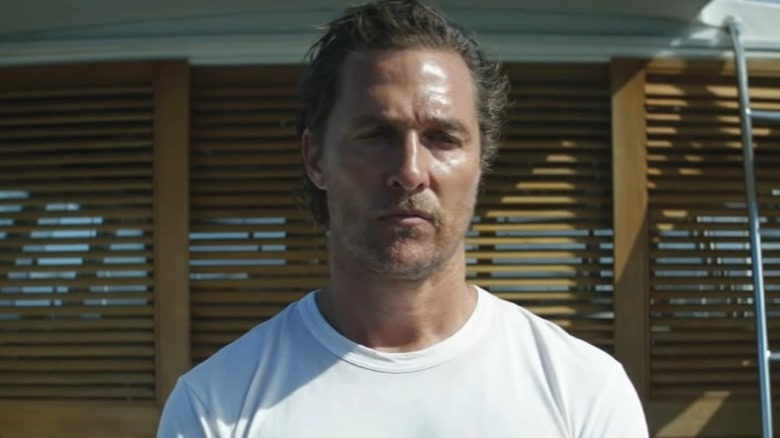Worst Twist Endings In Movie History
Like any other storytelling device, the twist ending can be great if used properly. Everyone remembers the first time they learned that Darth Vader was Luke's father in "Star Wars: The Empire Strikes Back" and that Bruce Willis was dead all along in "The Sixth Sense."
However, this storytelling sleight of hand isn't easy to pull off. Any screenwriter can slap a reveal at the end of a plot, but the twists that work are set up subtly throughout the story and enrich everything leading up to it. Contrary to the popular opinion that there's no point in seeing a movie if you know the twist, the best twists can increase the film's rewatchability. This is because viewers now have a chance to go back and see the story again, this time with insider knowledge, to try to pick up any clues they missed the first time. It can be of the most rewarding cinematic experiences there is.
Unfortunately, for every good twist, there are at least as many that are outrageous, lazy, manipulative, far-fetched, too predictable, not predictable enough, or just laughable. Some movies can survive a clumsy reveal, but others build their plot around the twist and go down like the Titanic when it doesn't work. So what are the worst twist endings in movie history? We've taken the liberty of assembling them here, but be warned — there are some major spoilers ahead.
Talia Al Ghul's reveal in The Dark Knight Rises
"Batman Begins" got people to take the character seriously at the movies again, and "The Dark Knight" was an award-worthy sensation. So hype was understandably huge for "The Dark Knight Rises," the final film in Christopher Nolan's epic Batman trilogy.
However, the third film was in many ways a step down from its predecessors. There are several distracting plot holes, such as Bruce Wayne's inexplicable escape to Gotham after being imprisoned on the other side of the planet. Despite these issues, much of the movie still works. It's a bombastic thriller filled with excellent visuals, great performances, a worthy villain in Tom Hardy's Bane, and ultimately provides a satisfying conclusion to Bruce Wayne's story.
But the twists weren't great. The reveal that John Blake's (Joseph Gordon-Levitt) name was Robin was eye-roll inducing, but acceptable. But when Miranda Tate (Marion Cotillard) stabs Batman and reveals herself as Ra's al Ghul's daughter Talia, who has Bane on a leash and is carrying on the legacy of the League of Shadows by destroying Gotham, it had the whole theater groaning. The twist was simultaneously too predictable, especially for fans familiar with the source material, and so poorly handled that nobody thought a filmmaker like Nolan's caliber would stoop to something so corny. Luckily, the overall story was much bigger than this sloppy reveal and managed to succeed despite it.
It was all in his head in Identity
John Cusack leads an excellent cast in "Identity," a slasher whodunit loosely based on Agatha Christie's "And Then There Were None." The film follows ten strangers stranded in a hotel who are mysteriously killed off one by one. As the story progresses, viewers are shown flashbacks depicting important events that occurred shortly before the guests arrive.
The big twist is that none of this happened. Malcolm Rivers (Cusack) is a condemned serial killer due to die in less than two days. His lawyers try to stay the execution, leading to an 11th-hour trial in which it's revealed that Rivers has Dissociative Identity Disorder. The killings of the hotel guests represent Rivers killing his different personalities.
We're almost on the fence with this one. Twists like this, that the screenplay was built around, always work better than twists slapped on at the last minute to elevate a lousy, boring story by shocking the audience. This one is certainly unique and thought-provoking, but ultimately too absurd and far-fetched to stick the landing.
The movie sharply divided critics upon release and now sits with a 62% on Rotten Tomatoes. While some reviewers praised the film's unexpected twists and turns, others expressed exasperation with what they saw as a forced, immersion-shattering reveal. But the fact that it's close is enough to warrant a place on this list.
It was modern day all along in The Village
M. Night Shyamalan has had one of the most bizarre careers in Hollywood history. "The Sixth Sense," "Unbreakable," and "Signs" were all wildly popular award season contenders and established him as one of the hottest directors at the start of the millennium. However, a decade later M. Night Shyamalan was largely associated with critically panned films like "Lady in the Water," "The Happening," and "The Last Airbender." In fact, the poster for his 2013 film "After Earth" even omitted his name, per The Denver Post. What happened between the unforgettable twist of "The Sixth Sense" and the cringe-inducing cheese of "The Last Airbender" is anyone's guess.
We do know where the first signs of trouble started popping up — 2004's "The Village." In this movie, isolated 19th-century Pennsylvanian villagers are stalked by strange monsters that lurk in the woods. It was a spine-tingling premise, and audiences couldn't wait to see what neck-snapping twist Shyamalan had in store. Sadly, the director stumbled. The twist, revealed when a character runs out onto a highway and sees a modern park ranger, was that the town existed in the present and that the leaders were the monsters all along. The elders terrorized the populace to keep them in line and apart from the outside world. The reveal made sense, but it sucked the fun out of the story. Just because a surprise ending is unexpected and logically consistent doesn't make it a good twist.
It was Grindlewald in Fantastic Beasts and Where to Find Them
JK Rowling isn't the only one making things worse for the legacy of the "Harry Potter" series. The folks behind the "Fantastic Beasts" movies are helping out too.
Don't get us wrong. The first movie, in which British wizard Newt Scamander (Eddie Redmayne) tries to recapture his escaped magical creatures in New York City, is pretty delightful. Redmayne charms in the lead role, his sidekicks are a blast, and the various fantastic beasts that viewers see live up to their name.
However, the movie was never really about simply recapturing escaped Billywigs and Bowtruckles. It had to get to the bottom of an anti-muggle plot orchestrated by Percival Graves (Colin Farrell), the Director of Magical Security. When Newt, his friends, and their beasts finally apprehend Graves, they expose him as legendary dark wizard Grindlewald (Johnny Depp) in disguise.
That kind of twist might've worked in a lesser franchise, but you can only introduce a major character like Grindlewald once, and this reveal cheapened him moving forward. Worse still, it set up a decidedly unmagical letdown of a sequel in "Fantastic Beasts: The Crimes of Grindlewald."
The kid is an adult in Orphan
Like many other movies on this list, "Orphan" has a promising start. After the stillbirth of their child, Kate (Vera Farmiga) and John Coleman (Peter Sarsgaard) decide to adopt a nine-year-old girl from Russia named Esther.
The thing is, Esther is not a normal kid. Some problematic behavior might be expected of any child who's waiting for a home in the foster care system, but Esther is a different kind of troubled. She interrupts the Colemans during intimate moments and reveals an alarming level of knowledge about sexual topics. She scares the Colemans other children, five-year-old daughter Max (Aryana Engineer), who's deaf, and 12-year-old Daniel (Jimmy Bennett), who has misgivings about Esther from the beginning, by killing animals in front of them. Sister Abigail (C.C.H. Pounder), who runs the orphanage Esther was adopted from, later informs Kate and John that tragedy always seems to follow Esther around. Thanks, sister. That would've been nice to know from the beginning.
Kate is quickly convinced Esther is sinister, but it takes John longer to accept the malevolence behind their new daughter's behavior. John finally admits that something is off when Esther tries to seduce him, but it's pretty much too late at that point. Shortly thereafter, viewers learn that Esther isn't nine at all, and she isn't Esther. She's a tiny 33-year-old Estonian woman named Leena. Yes, you read that right, and it explains a lot. But that doesn't make it any less ridiculous.
The FBI agent masterminded the heist in Now You See Me
Listen, we understand that a film about criminal magicians whose tricks involve robbing the rich and giving to the poor is going to have a lot of twists. In fact, with a logline like that, the only twist we wouldn't see coming from a mile away is if there were none.
And this film has a lot of twists. In a nutshell, The Four Horsemen, a group of expert illusionists, rob wealthy benefactors and shower their audiences with money. FBI agent Dylan Rhodes (Mark Ruffalo) leads the labyrinthine investigation into their crimes, chasing them through New York and across Europe. It's a pretty cool idea for a movie, and the A-list cast featuring Woody Harrelson, Jesse Eisenberg, Morgan Freeman, and Isla Fisher comes admirably close to selling the film. Some scenes are genuinely fun and well put together, but the movie starts to sag under the weight of all the fakeouts, improbable escapes, and double-crosses.
And then there's the final big twist — Rhodes, the FBI agent hunting down The Four Horsemen, is not only a magician himself but the son of another legendary illusionist and the mysterious mastermind behind the crew's latest epic heist. Far fetched doesn't begin to describe this laughable development, which cheapens everything leading up to it.
He was a ghost all along in Last Christmas
Christmas movies don't usually wow critics and are often little more than a heartwarming distraction for everyone else. But Christmas movies that take their premise from Christmas song lyrics? Now that's a recipe for narrative disaster.
Enter "Last Christmas." In this story, Kate, an aspiring singer played by Emilia Clarke, lives with her parents after losing her job and getting thrown out of her lover's house by his partner. The one bright spot in her life is Tom (Henry Golding), with whom she's infatuated. After the two connect, she reveals she had a heart transplant a year earlier. One day, Kate visits Tom's apartment and discovers it's being sold. She then learns that the previous owner, an organ donor, died in a bicycle accident the previous Christmas. Kate then puts two and two together and realizes — Tom is the previous owner. When he died, she received his heart.
So he was a ghost all along. Great.
After learning this, Kate tries to focus on doing good for others, as Tom would've wanted. She spends more time outside and sings a certain Wham! song at the homeless shelter she volunteers at while reminiscing about the good times she had with her boyfriend, who didn't exist. What were the lyrics again? Oh, right. "Last Christmas, I gave you my heart." Get it? Yeah, we do too.
He died on 9/11 in Remember Me
For most of its runtime, "Remember Me" is a sweet but ultimately forgettable rom-com. Tyler Hawkins (Robert Pattinson) works at the NYU bookstore and audits classes there, while Ally (Emilie de Ravin) is a student. One night, Tyler and his roommate, Aiden (Tate Ellington), are arrested by Ally's father Neil (Chris Cooper), an NYPD detective, after getting involved in a fight in which they were not at fault. When Aiden discovers Neil is Ally's father, he convinces Tyler to sleep with and then dump Ally to get revenge.
Predictably, Tyler and Ally instead fall in love after bonding over their shared trauma and issues with their neglectful fathers. It turns out Tyler's brother had taken his own life years earlier, leading his father to focus on raising his sister who struggles socially and needs support. Meanwhile, Ally reveals her mother was mugged and murdered when she was younger. By this point, some viewers might be rolling their eyes at all this cheap emotional manipulation, which uses extreme tragedy as a stand-in for more subtle character development. But that's nothing compared to what's coming next.
After some of these plot threads have been resolved, Tyler looks out the window of his new office, located in the north tower of the World Trade Center, on September 11, 2001. Seriously, can you get any more clumsily manipulative than that?
The second half of Hancock
With the release of both "Iron Man" and "The Dark Knight," 2008 was a great year for superhero movies, although there certainly were some misfires. "The Incredible Hulk" wasn't much to write home about, for example.
And then there's the largely forgotten "Hancock." Will Smith plays the title character, an abrasive, alcoholic Superman-type who can't remember who he is. Jason Bateman plays Ray Embrey, a PR specialist who volunteers to help Hancock revitalize his image after the hero saves his life. With that fun and pretty unique premise, the pieces were all there for a recommendable one-off action-comedy superhero flick.
But then the second half of the movie happens. It turns out Ray's wife (Charlize Theron) is also an immortal superhuman. And Hancock's ex-wife. Beyond that, it turns out that superheroes only have powers when they're apart and that his proximity to her made him vulnerable to an attack 80 years ago, resulting in his hospitalization and amnesia.
Not one of the other very real revelations enriched the story or built on the solid first act. It felt like the screenwriters threw everything at the wall to see what would stick, eventually deciding to go with all of their ideas simultaneously, and sinking a promising film as a result.
It was all digital in Serenity
The issues inherent in "Serenity" surprised audiences and critics alike, as Matthew McConaughey and Anne Hathaway had created gold together in the past with "Interstellar," and had each starred in plenty of excellent films on their own. But this movie, not to be confused with the vastly superior 2005 sci-fi cult favorite of the same name, didn't exactly continue their winning streak.
The plot sounds intriguing enough, at least on paper. Dill Baker (McConaughey), a boat captain, is asked by his ex-wife Karen (Hathaway) to save her and her son Patrick (Rafael Sayegh) by murdering her abusive husband, Frank (Jason Clarke). She books the guy for a ride on Dill's boat for a week, so it should be easy to toss him overboard where nobody can see or prove foul play. Dill wrestles with his conscience and his desire to help his former lover, setting up an intriguing moral dilemma.
But movies don't get on a list like this by sticking the landing. Just try to guess what the final twist is. Ghosts? Is Frank already dead? Was it all a dream? Nope. It turns out Dill is a computer game character designed by Patrick, Karen's son. Only after Dill completes his in-game objective does Patrick work up the courage to kill Frank in real life.
We get wanting to tell a unique story. Just make sure the reason it's never been told isn't because it was this ridiculous.
Rey's a Palpatine in The Rise of Skywalker
Not unlike the "Star Wars" prequel trilogy, the sequels had a rocky time and divided fans. "The Force Awakens" was a welcome return to form for many, but too similar to "A New Hope" for others. "The Last Jedi" delighted critics with loads of fresh, thought-provoking ideas, but those same storytelling choices left many fans with a bad taste in their mouths. And then there's "The Rise of Skywalker," which pleased almost no one.
One of this movie's many, many narrative missteps was how it handled the long-running question of Rey's (Daisy Ridley) parentage. "The Force Awakens" established the mystery but didn't solve it, setting up an intriguing hook for future films. "The Last Jedi" challenged the trope that protagonists in fantasy films, especially in "Star Wars" movies, must have a noble lineage.
However, "The Rise of Skywalker" refuses to follow up on that and instead reveals Rey to be the granddaughter of Emperor Palpatine (Ian McDiarmid), whose resurrection was another stupid and lazy plot point. We suppose the filmmakers thought Rey being a Skywalker would be too predictable, so they went with the second option on the list, shrugged, and moved on. Apparently, no thought whatsoever was given to the myriad of stupid implications this has for the saga at large. But by that point, many fans had given up anyway.
